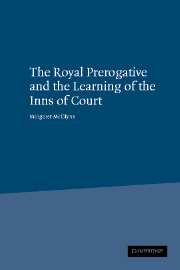Book contents
- Frontmatter
- Contents
- Preface
- List of figures
- List of abbreviations
- Introduction
- 1 The early readings
- 2 Expansion and debate
- 3 Frowyk and Constable on primer seisin
- 4 Spelman, Yorke, and the campaign against uses
- 5 The Edwardian readers and beyond
- Conclusion
- Notes on the appendixes
- Appendix 1 Thomas Frowyk's reading on Prerogativa Regis
- Appendix 2 John Spelman's reading on Prerogativa Regis
- Bibliography
- Index
Appendix 2 - John Spelman's reading on Prerogativa Regis
Published online by Cambridge University Press: 04 July 2009
- Frontmatter
- Contents
- Preface
- List of figures
- List of abbreviations
- Introduction
- 1 The early readings
- 2 Expansion and debate
- 3 Frowyk and Constable on primer seisin
- 4 Spelman, Yorke, and the campaign against uses
- 5 The Edwardian readers and beyond
- Conclusion
- Notes on the appendixes
- Appendix 1 Thomas Frowyk's reading on Prerogativa Regis
- Appendix 2 John Spelman's reading on Prerogativa Regis
- Bibliography
- Index
Summary
[f.303]Spelman's lecture in Lent vacation 12 Henry VIII
Dominus rex habebit custodiam [The lord king shall have the wardship] etc. The beginning of this letter is a declaration of the common law and that this was the common law appears by Magna Carta cc.22 and 29 and common reason gives this to the king. And prerogative […] other except lease given to his tenant […] And by the exception de feodis archiepiscopi [the archbishop's fees] etc. all this branch is a statute, for before this time the king had the wardship of lands held of such persons as well as of others, except of the bishop of Durham, and in the counties of Chester […] and in such places where the king's writ does not run. And this statute was made for this exception, for all of the rest is following the common law.
And by this word custodiam [custody] is implied the profits of the land etc., yet if the king grants the wardship of the body without speaking of marriage, the grantee cannot marry him.
Omnium terrarum [of all lands] is understood to be lands, tenements, rents, advowsons, commons, corrodies, and all profits appendant, offices, and all things of inheritance except annuities, for [he] will not have those.
Qui de ipso tenent in capite per servicium militare [who holds of him in chief by knight service]: in chief and of the crown are both one.
- Type
- Chapter
- Information
- The Royal Prerogative and the Learning of the Inns of Court , pp. 295 - 306Publisher: Cambridge University PressPrint publication year: 2003



